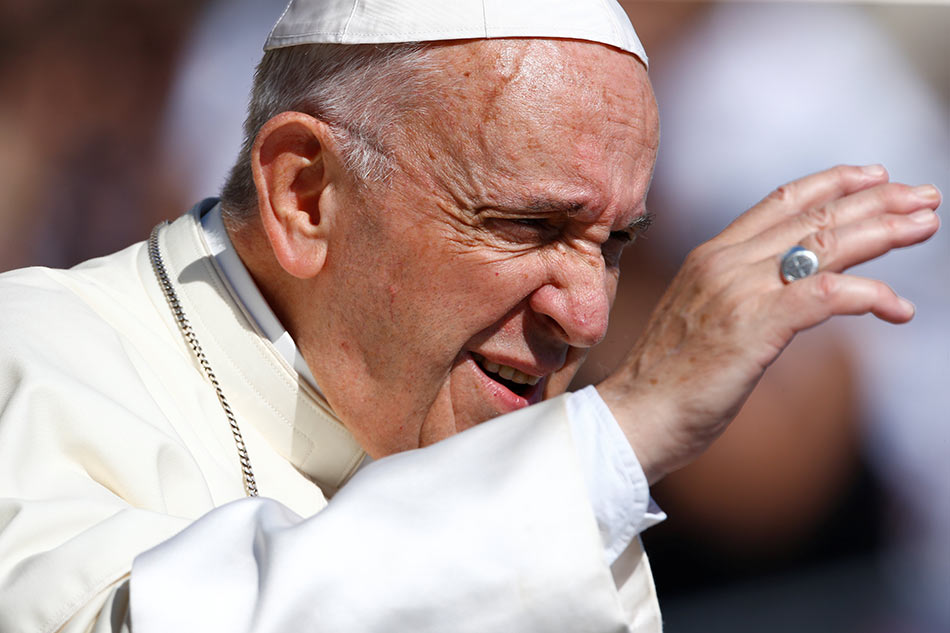Pope says China talks going well, dialogue worth the risk
ADVERTISEMENT

Welcome, Kapamilya! We use cookies to improve your browsing experience. Continuing to use this site means you agree to our use of cookies. Tell me more!
Pope says China talks going well, dialogue worth the risk
Philip Pullella,
Reuters
Published Jun 20, 2018 08:52 PM PHT
VATICAN CITY—Pope Francis has voiced optimism for improved ties between the Vatican and China, rejecting criticism that the Holy See may be selling out Catholics to Beijing's communist government.
VATICAN CITY—Pope Francis has voiced optimism for improved ties between the Vatican and China, rejecting criticism that the Holy See may be selling out Catholics to Beijing's communist government.
The Vatican and China are in advanced talks to resolve a dispute over the appointment of bishops in China, one of the biggest obstacles to resuming diplomatic ties that were cut almost 70 years ago.
The Vatican and China are in advanced talks to resolve a dispute over the appointment of bishops in China, one of the biggest obstacles to resuming diplomatic ties that were cut almost 70 years ago.
"We are at a good point," the pope told Reuters in an interview at his Vatican residence.
"We are at a good point," the pope told Reuters in an interview at his Vatican residence.
China's estimated 12 million Catholics are split between an underground Church that swears loyalty to the Vatican and the state-supervised Catholic Patriotic Association.
China's estimated 12 million Catholics are split between an underground Church that swears loyalty to the Vatican and the state-supervised Catholic Patriotic Association.
ADVERTISEMENT
Pope Francis did not comment in the interview on the details under discussion but said dialogue was the best way forward.
Pope Francis did not comment in the interview on the details under discussion but said dialogue was the best way forward.
"Dialogue is a risk, but I prefer risk rather than the certain defeat that comes with not holding dialogue," he said.
"Dialogue is a risk, but I prefer risk rather than the certain defeat that comes with not holding dialogue," he said.
"As for the timing, some people say it's 'Chinese time'. I say it's God's time. Let's move forward serenely."
"As for the timing, some people say it's 'Chinese time'. I say it's God's time. Let's move forward serenely."
Francis said the road to reconciliation with China was divided into three paths -- the official dialogue, unofficial contacts among ordinary citizens "which we do not want to burn," and cultural dialogue.
Francis said the road to reconciliation with China was divided into three paths -- the official dialogue, unofficial contacts among ordinary citizens "which we do not want to burn," and cultural dialogue.
"I think the Chinese people merit the Nobel Prize for patience. They know how to wait. Time is theirs and they have centuries of culture .... They are a wise people, very wise. I have great respect for China," he said.
"I think the Chinese people merit the Nobel Prize for patience. They know how to wait. Time is theirs and they have centuries of culture .... They are a wise people, very wise. I have great respect for China," he said.
The most outspoken critic of the pope's China strategy is 86-year-old Cardinal Joseph Zen, a former bishop of Hong Kong, who has said the direction of negotiations suggests the Vatican is preparing to sell out the underground church.
The most outspoken critic of the pope's China strategy is 86-year-old Cardinal Joseph Zen, a former bishop of Hong Kong, who has said the direction of negotiations suggests the Vatican is preparing to sell out the underground church.
In Hong Kong, a beachhead for Vatican loyalists in southern China, some priests say the talks could be a trap leading to greater persecution of underground believers and ultimately to tighter Communist Party control of their religion. (Editing by Mark Bendeich and Timothy Heritage)
In Hong Kong, a beachhead for Vatican loyalists in southern China, some priests say the talks could be a trap leading to greater persecution of underground believers and ultimately to tighter Communist Party control of their religion. (Editing by Mark Bendeich and Timothy Heritage)
ADVERTISEMENT
ADVERTISEMENT



